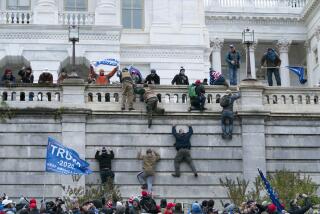Forcing Democracy on Nicaragua at the Point of a Gun
The chief obstacle to a settlement of the Nicaraguan conflict is the Reagan Administrationâs insistence that the country abandon Sandinism and âdemocratize.â
At first blush, this demand seems to have some rational basis. Assistant Secretary of State Elliot Abrams put it clearly back in August, 1985: We âinsist on internal reconciliation . . . because the only guarantee that security agreements that are made will stick is internal democracy . . . . It is preposterous to think we could sign a deal with the Sandinistas to meet our foreign-policy concerns and expect it to be kept.â
Not long ago it was preposterous to think that the United States would sign a deal with the Peopleâs Republic of China. True, Beijing is not as close to Washington as Managua is, but Beijingâs behavior toward its neighbors who are our friends is a key U.S. foreign-policy concern.
We make carefully crafted, verifiable and enforceable deals with our adversaries all the time. To say that the adversary must convert before we will deal makes a mockery of diplomacy. What, then, is driving the demand for âdemocratizationâ of Nicaragua?
The taproot goes deep into the American psyche: the notion that we are what Puritan John Winthrop called âa city upon a hill.â He envisioned his theocratic settlement as a moral example in âthe eyes of all people.â The myth that we are a chosen people gradually became secularized, and, as Americaâs world power grew in the late 19th Century, Presidents like Theodore Roosevelt helped transform the good example into a mission, backed by force, to save mankind. It was this moral mission that underlay Ronald Reaganâs prediction, in announcing his candidacy for President in 1979: âWe will become that shining city on a hill.â
During his campaign, Reagan stressed the need for the American psyche to be purged of the Vietnam syndrome, and to do this he meant to ârearm America,â which included âmoral rearmamentâ as well as military rearmament. âI have always believed that this anointed land was set apart in an uncommon way,â he said in 1982, âthat a divine plan placed this great continent here between the oceans to be found by people from every corner of the Earth who had a special love of faith and freedom.â Support for Nicaraguan âfreedom fightersâ thus became essential.
To those who are commited to âsaveâ Nicaragua, the realistsâ arguments for negotiations are requests to make a pact with the devil. Those who would compromise in the name of peace, economic development or even national security are betraying a sacred, historic responsibility. There is a temptation for realists to throw up their hands when confronted with arguments for âdemocratizationâ that are rooted in this moral messianism. But it is worth taking the argument head on: Is continued support for the contra war the best way for the United States to encourage democracy in Nicaragua?
There are two guideposts in navigating the rhetorical quicksand: The security threat posed by the contras to the Nicaraguan government is encouraging less, not more, political freedom. And in the unlikely event of a contra victory the chances for democracy would be even slimmer.
Events of the last five years have shown that as military pressure on the Sandinistas increases, they grow less tolerant of internal opposition--which tends to be identified, rightly or wrongly, with the armed contras.
A momentâs reflection about how even well-developed democracies respond when engaged in war underlines this point. Our own history offers ample evidence. The Espionage Acts during World War I made it a crime to advocate in public âthe cause of (our) enemies,â to âobstruct recruiting,â even to discourage the sale of war bonds. After Pearl Harbor, all persons of Japanese origin in this country (more than 110,000) were interned without due process. Such comparisons are not to excuse the Sandinistas, but they should remind us that war is not a great promoter of domestic political freedom and democracy.
Would Nicaraguans fare any better under the contras? Put aside for the moment the often-repeated arguments that the contrasâ key military leaders were members of Anastasio Somozaâs national guard. Suppose that by some miracle the more decent, less authoritarian civilian contra leaders (now only fronts for those who wield real power) took control of a new counterrevolutionary government in Managua. They would have to rule a country economically devastated by years of civil conflict. They would be resisted by thousands of well-armed, well-trained Sandinista guerrillas, undoubtedly supported by important sectors of the population. It defies imagination to believe that a government led by even the best-intentioned politician--say, an Arturo Cruz--could survive without imposing anything less than severe, authoritarian rule. And that, of course, would be self-defeating.
In using force to impose moral abstractions, to convert others to our truth, pure hearts often sacrifice the precepts of democracy along with the lives of the very people whom they want to save for democracy. They are like the American officer who justified the destruction of the Vietnamese hamlet of Ben Tre by U.S. firepower: âIt became necessary to destroy the town to save it.â
During the height of that war, historian Arthur Schlesinger asked âwhether this country is a chosen people, uniquely righteous and wise, with a moral mission to all mankind.â That was in 1967; from todayâs perspective, his answer is still pertinent: âThe ultimate choice is between messianism and maturity.â
More to Read
Sign up for Essential California
The most important California stories and recommendations in your inbox every morning.
You may occasionally receive promotional content from the Los Angeles Times.










